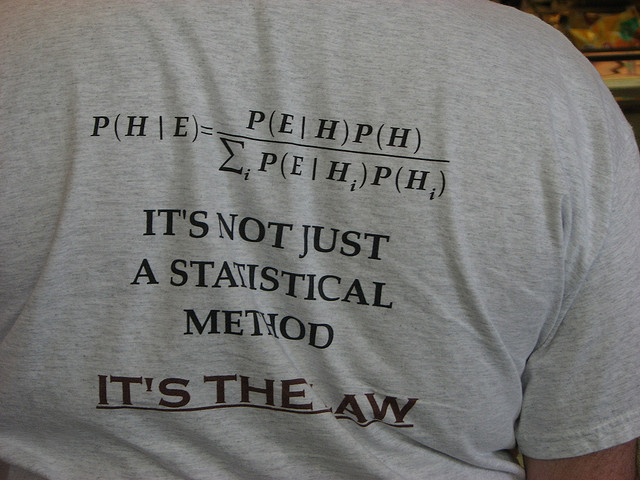Epistemology in the courts. Or, Sherlock Holmes is dead, long live to Thomas Bayes.

Strange as it may sound to many people, the fact is that some of the most interesting work on epistemology that is being currently done in Spain is carried out at the headquarters of the Spanish gendarmerie (the well known force called Guardia Civil), in particular, at the Area of Statistics within the corps’ Service of Criminal Science (“Servicio de Criminalística”). The work that is done there relates to what is usually called “social epistemology” 1, i.e., the study about how societies, or social groups in general, manage to extract, assess, distribute and employ information. Social epistemology can either be descriptive or normative; the former studies how knowledge (or beliefs) are actually produced and used, whereas the latter tries to establish whether these epistemic processes are efficient in the attainment of their goals (or at least the agents’ goals), and it even may try to design efficient (or more efficient) epistemic mechanisms.
One of the key areas whether we can observe ‘knowledge’ being produced both by means of a social process, and having as output something that not only has social, but also legal compulsoriness (i.e., it is compulsory to accept as ‘knowledge’ the result of that process), are, obviously, tribunals. Courts have the legal capacity of taking something as ‘proved facts’, in order to condemn or to absolve accused people. In order to take that decision, judges can demand the testimony of experts or the collection of evidences. One of the key problems in forensic science is to establish the relationship that exists, or should exist, between those testimonies and evidences, on the one hand, and the conclusions they can support or not, on the other hand. This relationship is not merely logical, or statistical, but, and this is the most important matter from a social, legal or ethical point of view, it also depends on the value we put into things like innocence presumption, constitutional guarantees, and the efficiency of the judicial system (stated in statistical terms: it depends on how differently we evaluate type I vs. type II errors, i.e., condemning an innocent person vs. absolving a guilty one).
One big change of paradigm experienced in forensic science during the last decades (and one which parallels the evolution of our ideas about knowledge, and of statistical theories in particular) has been the passing from a purely logical view of evidence assessment, to an essentially probabilistic view. The former is well exemplified by classical fictitious detectives as Sherlock Holmes or Hercules Poirot, who inerrantly discovered the true criminals through a chain of merely logical steps. As Holmes famously asserted, “when you have eliminated the impossible, whatever remains, however improbable, must be the truth” (A. C. Doyle, The sign of the four2). The goal of expert testimony (e.g., police investigators collecting evidences from the crime scene, or laboratory technicians analysing these evidences) should be, according to this ‘Holmesian’ paradigm, to establish the truth of the facts, a truth to which the judge could no more than defer. But now we know that all (or almost all) evidence is just probabilistic: ‘facts’ or ‘observations’ don’t proof the truth of our hypotheses, but only give them a higher or lower probability, though in many cases it can obviously be an extraordinarily high probability. So, paraphrasing Holmes’ saying: “when we have eliminated the impossible, what remains is the probable, and we have to look for the least improbable hypotheses”. According to this new probabilistic or Bayesian paradigm, the role of the tribunal should not be just to insert the investigators’ or experts’ conclusions as additional premises within a purely deductive argument, but to take the latter’s testimony as evidence that help to assess the (posterior) probability that the hypotheses considered in the trial may have. Or, stated in a different way: what judges have to do is to judge.
The Service of Criminal Science of the Spanish Civil Guard has constituted a working group including experts from most of the other Spanish police forces (Policía Nacional, Ertzaintza, Mossos d’Esquadra, Policía Foral), as well as researchers from forensic laboratories, public institutes and universities, and from fields as statistics, law and epistemology, basically in order to prepare Spanish forensic and judicial system for the future application of a European Union directive about the application of this new Bayesian paradigm to criminal judicial procedures. As some of the members of the group state in a recent paper 3, the fact is that the latest reform of the Law of Criminal Procedure in Spain (2002), and attempts of future reforms, seem to go exactly in the opposite direction, by allowing expert testimony from official criminalistic laboratories be considered as ‘documentary proof’, i.e., as something the judge can take for granted without giving attorneys the chance of interrogating the experts in the tribunal, or of requesting antagonistic, independent analyses of the evidences. As these author claim, though this procedure might be vindicated for reasons of simplicity, and mostly of cheapness, it not only represents a backward movement in relation to the international tendency towards a probabilistic interpretation of the evidence in the courts, but also clearly goes against the constitutional guarantees of the defendants, who may lose the capacity of having the proofs examined by independent experts.
References
- Goldman, A., 1999, Knowledge in a social world, Oxford, Oxford University Press. ↩
- Doyle, A. C., 1890, The sign of four (many editions) ↩
- Lucena Molina, J.J., V. Pardo Iranzo, and J. González Rodríguez, “Weakening forensic science in Spain: from expert evidence to documentary evidence”, Journal of Forensic Science, 57.4, 952-963. ↩
1 comment
Interesting and well written. Curious to see that some tendencies in Spain keep going backwards as compared to the general trend of knowledge, even the so-called social epistemology…